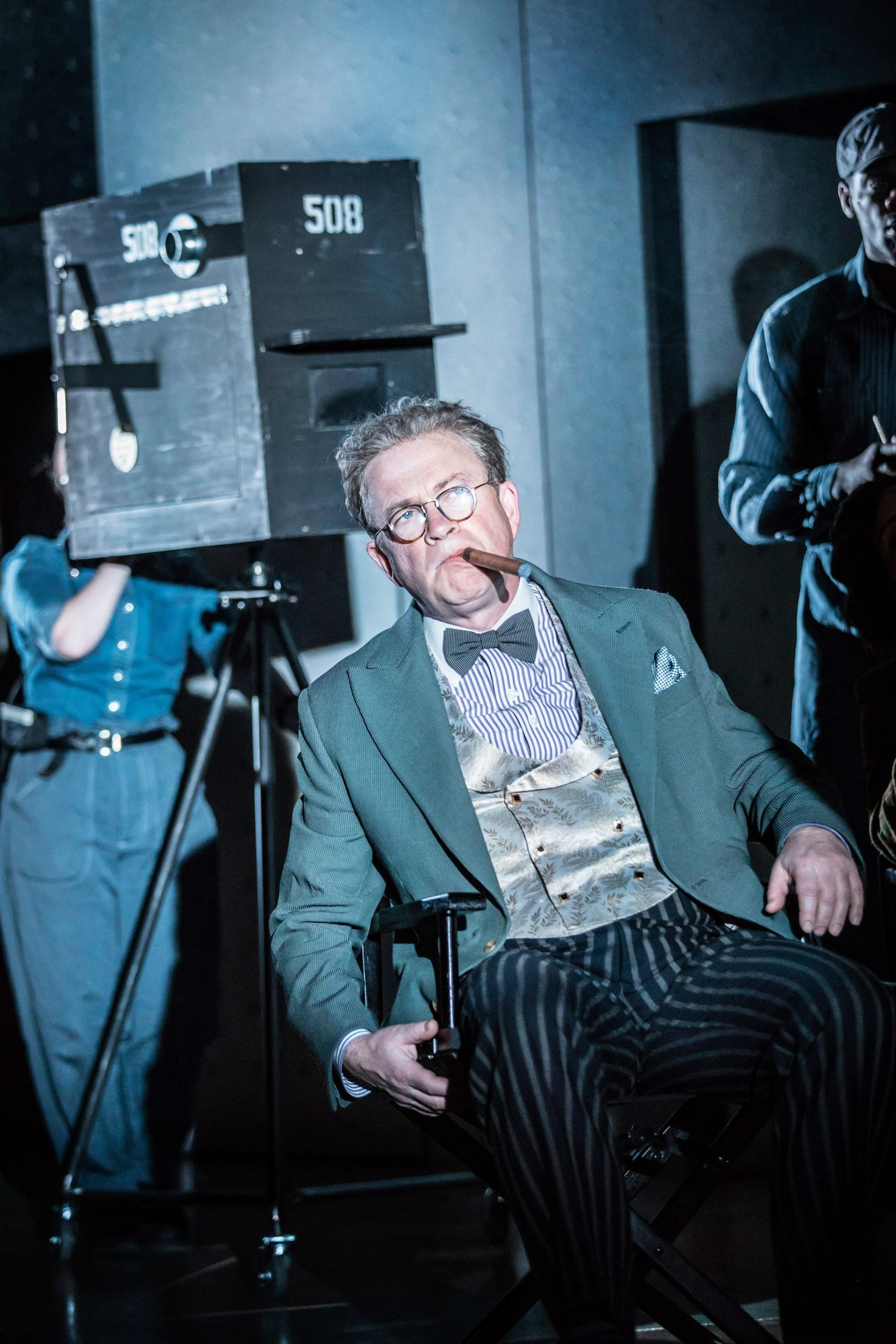Once in a Lifetime, Young Vic, London, review: Harry Enfield plays a studio mogul in a curiously underpowered performance
The comedian Enfield makes his stage debut in this classic Broadway comedy, directed by Richard Jones, which is set during the momentous advent of the talkies

Would you be able to tell that neither Kaufman nor Hart – the authors of this 1930 Hollywood satire – had set foot in Tinseltown before they completed it? It speaks volumes about the mad unreality of the movie industry that the pair were able to concoct such an influential piece solely from scandalised gossip and an assiduous study of Variety. The material, though, is a bit too broad-brush and hollow at heart and it’s no real surprise that the play has been superseded on stage and screen by works that benefit from the first-hand experience of their creators. Richard Jones’s revival at the Young Vic is delightfully droll and mostly spot-on in its casting and design. It generates considerable good will while never entirely allaying the suspicion that first-rate talent is being trained here on non-top-drawer stuff.
The play is set during the momentous advent of the talkies. The Jazz Singer has just opened and Hollywood is in ferment. Three down-at-heel vaudevillians – thrusting Jerry (Kevin Bishop); dimwitted George (John Marquez) and the wise-cracking, love-lorn May (Claudie Blakley) – sell their ailing act and head to California where they hope to cash in on the transition by launching a (bogus) elocution academy for vocally-challenged silent screen stars. In the Pullman car en route (monochrome sketches of endless repetitive desert scroll wittily by), they run into Helen Hobart (a killer-vampish, if ironically indistinct Lucy Cohu), the celebrity gossip columnist who is swathed in spangles and regal superciliousness. Intrigued by their scheme, she secures them an introduction to Glogauer, a studio mogul (“That’s the way we do things out here – no time wasted on thinking”) who is played as a sort of baffled old buffer by Harry Enfield in a curiously underpowered performance.
John Marquez is sublimely good as George, a cross between a dope and a holy fool who blunders his way into success by nervously parroting the wisdom he has read in Variety (“The legitimate stage must look to its laurels”) or by borrowing the rage of others as in the glorious sequence where this indignant but mild-mannered man goes through the motions of the tirade he has just watched from a frantically frustrated writer. It’s like watching Stan Laurel trying to do an impression of Stanley Kowalski (the beating of the head against the wall is exquisitely funny). But every botched job backfires to his credit. A mistakenly impressed Glogauer appoints George to run the studio. The egregious flaws in his first movie (the failure to light some scenes; the constant sound of the director cracking his beloved India nuts) are hailed by the critics for their avant-garde brilliance.
The other outstanding performance is by Amanda Lawrence as an angular receptionist who is going just a little crazy as she struggles to keep up with her author-obstructing duties. Her juggling with the telephones (snatching up a stapler to one ear); her interlude of reflective respite with a cake; the fact that she continually gets blocked in doorways with the gossip columnist; and trots devotedly after Glogauer with a solid gold coffee mug – these are moments of cranky, deliciously executed physical comedy. The downside of the show is that the satire never feels specific enough and that you wait in vain for the troubled relationship between the other two in the vaudeville trio (Jerry, to May’s disgust, comes close to selling out, for real, to Hollywood values) to develop a satisfying depth. Given Claudie Blakey’s genius for wry, mordant comedy, it’s frustrating that, however charming and mischievous she is here, she is largely confined to two dimensions.
Richard Jones and the Young Vic are to be congratulated, though, for the puckish poise and dexterity which which the sets revolve and Hyemi Shin’s excellent designs whisk up from setting to setting (always with an amusing touch – like the metronomes that waggle in synch like miniature Busby Berkeley chorines in elocution lab). I may not be a massive fan of the piece, but I applaud this production as the best and least overblown account of it that I have seen.
Subscribe to Independent Premium to bookmark this article
Want to bookmark your favourite articles and stories to read or reference later? Start your Independent Premium subscription today.

Join our commenting forum
Join thought-provoking conversations, follow other Independent readers and see their replies